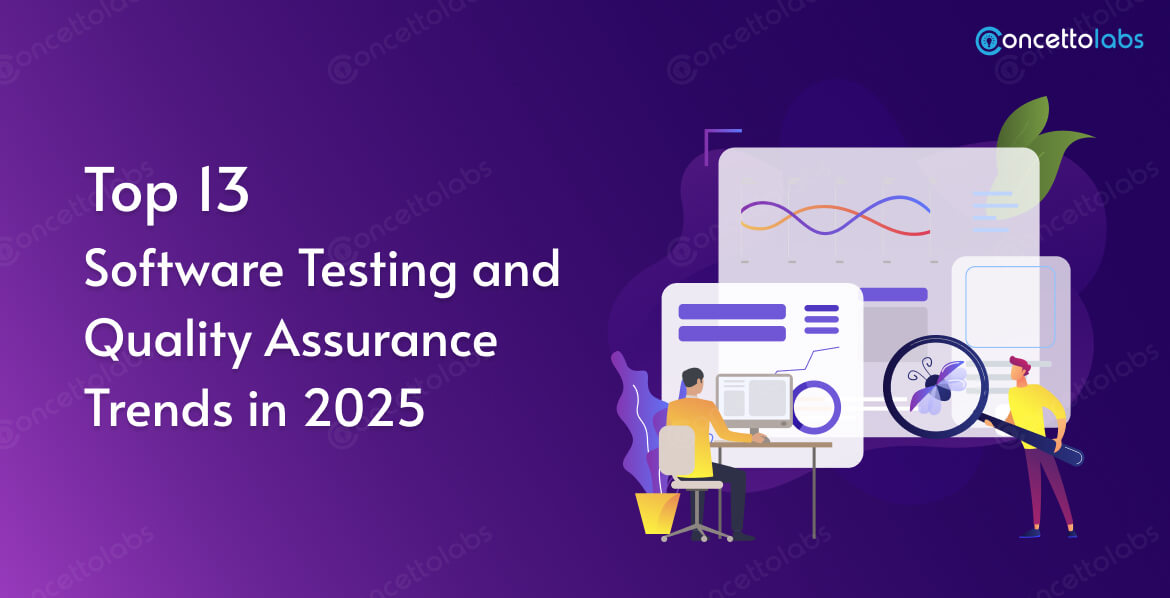
Summary: In today’s article, we will discuss software testing with AI, where artificial intelligence assists QA testers during the testing process. AI can help software industries by increasing test coverage, improving the overall quality of software, and enhancing testing efficiency.
Artificial intelligence has introduced new possibilities and efficiencies for software testing. The demand for efficient, faster, and reliable testing processes is increasing with the complexity of modern application development. To handle such challenges, AI has introduced the field of automated software testing. By using AI algorithms, advanced analytics, and machine learning, it is possible to make remarkable changes in the software testing process. This process has helped organizations speed up the testing process with proper accuracy and coverage in their testing evaluations.
Here, we have described the impact of AI on the software testing process in terms of its capabilities and benefits. Indeed, the software testing life cycle doesn’t get affected when using AI. It follows the same cycle of requirement gathering, test planning, test case creation, setting up a test environment, test execution, and test closure. To understand the potential grip of AI on the future of software quality assurance, let’s understand more about AI.
How Does AI Help in the Software Testing Process?

This description is to enlighten the role of artificial intelligence in assisting QA while doing the process of software testing. We are going to describe key aspects of transformation.
1. Automatic test case update: AI algorithms monitor the application and the changes that happen to the application so that they can change the test cases accordingly. It dynamically updates the test cases to reflect the modifications. Due to this, the efforts required to maintain the test scenarios get reduced, and the process becomes effective over a certain period.
2. Visual Locators: These visual locators in AI applications focus on the visual elements of the applications, such as user interfaces and graphical components. During the automation testing, AI can analyze the screenshots and images. It monitors the interaction between the visual elements of the application. This can increase the accuracy of the testing and provide a seamless user experience for the clients.
3. Self-healing tests: AI for testing is capable of detecting failures or unpredictable behavior of an application while monitoring the test executions. Whenever any issue arises, AI can attempt a self-healing process to resolve that issue automatically. It adjusts the test environment and resolves the problem. This mechanism can reduce disruption and save time.
4. Elastically scale load, performance, and functional testing: AI in software testing solutions can effortlessly do resource allocation, through which optimum resource utilization can be achieved. This ensures that comprehensive testing coverage is possible through AI while maintaining its efficiency.
5. AI-powered predictive bots: AI-powered predictive bots are an advancement in the software testing process. Bots manipulate the ML algorithms in a way where predictions about the risk of potential defects can be identified. It analyzes historical data, trends, and patterns and draws judgments from them. By predicting potential issues proactively, bots contribute to the effectiveness of the software testing process.
6. Analytics of Test Automation Data: AI is capable of analyzing the vast amount of data during IoT App Testing, which can help in enhancing testing strategies and optimizing testing efforts. AI-powered analytical tools can significantly identify trends, anomalies, and patterns and provide valuable information for test improvement. This process can help the testing teams make proper decisions and work on hidden patterns that might have been ignored by traditional methods.
Benefits of Using AI in the Software Testing Process

AI finishes all the tasks assigned to it by a person, and after completing certain tasks, it learns from the tasks. Over time, AI improves its performance by learning from previous tasks.
Let’s Learn About the Advantages of AI for Software Testing.
- Early defect detection: AI is capable of finding defects earlier for quicker resolutions.
- High-quality test cases: AI has the capability of creating test cases according to needs. Even with the change in requirements, it can generate test cases for regression tests and API tests.
- Reduction in Cost: AI reduces manual testing efforts, which helps in saving costs, fast delivery to market, and quick resource allocation.
- Consistency and repeatability: AI consistently executes test cases and monitors them, which helps in generating more reliable results.
- Swift Feedback: AI can perform parallel test execution on multiple devices. This helps in testing the feedback cycle from stakeholders.
Let’s Have a Look at a Few Available Open-source Testing Tools.
When we are about to choose an open-source testing tool, it is necessary to consider several factors. Firstly, it is essential to verify that the tool we are going to choose is actively maintained and supported. Also, look for the technical expertise of team members using the tool. Furthermore, it is essential to check that the benefits, features, and challenges presented by the tool are in sync with your requirements.
A few Popular AI Open Sources are Listed Below:
- Test Project: It has been offered as the first free Appium AI tool in 2021, with an expansion upon the AI tools for Selenium previously introduced in 2020 for self-healing technology.
- Carina: It is an AI-driven tool with a scripless automated function. It is free forever and is used for performance, visual, and compatibility testing of software.
- Cerberus Testing: It is a low-code and scalable test automation solution that offers a self-healing feature with a forever-free plan.
Conclusion:
AI transforms traditional testing methods, enhancing efficiency, effectiveness, and reliability, making AI-based automation essential for modern organizations’ quality assurance. AI has revolutionized the traditional way of testing, and it has improved the efficiency, effectiveness, and reliability of the quality analysis process. AI-driven techniques such as anomaly detection, NLP, ML, and intelligent tests have improved the quality standard of organizations. It allows organizations to achieve higher test coverage, streamlined test script creation, early defect detection, and adaptive test maintenance. AI integration with automated testing not only speeds up the process but also improves overall quality. Organizations must adopt AI-based automation testing in their Software Testing and QA Services.
AI is continuously evolving, and it has the potential for advancement in automation testing. Cocettolab is the best company for SAAS Testing Services. If you are looking for an organization working on AI automation, you are in the right place. Because embracing the power of AI in automation testing is not only a strategic necessity for an organization but also a competitive advantage for one’s business,









 Indonesia
Indonesia
 Botswana
Botswana
 USA
USA
 Italy
Italy
 Panama
Panama









 USA
USA UK
UK Saudi Arabia
Saudi Arabia Norway
Norway India
India Australia
Australia